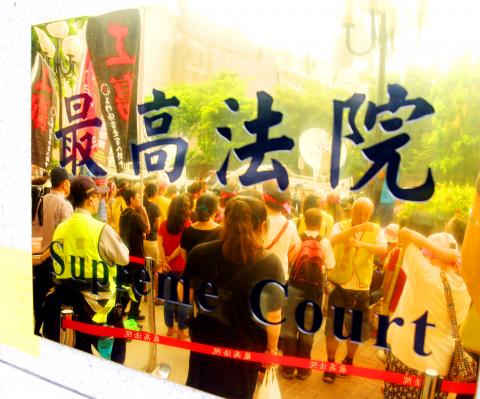The Legislative Yuan yesterday passed amendments to the Court Organic Act (法院組織法) and the Administrative Court Organization Act (行政法院組織法), making way for the establishment of collegiate grand chambers to resolve a recurring issue of courts at different levels issuing conflicting rulings in a case.
The amendments stipulate that the Supreme Court is to assemble a civil grand chamber and a criminal grand chamber of 11 judges each, while the Supreme Administrative Court is to have a grand chamber comprised of nine judges, with the chief justice of each court serving as the presiding judge of their respective chambers.
To ensure fairness in judgements by the grand chambers, the number of division chief judges doubling as chamber judges must not exceed half of each chamber’s makeup, one amendment says.

Photo: CNA
Should the legal basis invoked by either court contradict that cited by a high court, resulting in contradictory rulings on a case, the superior court should address the dispute by submitting a request for the corresponding grand chamber to state its opinions, the amendments say.
That grand chamber must issue a ruling on a dispute within 30 days, the amendments say, adding that while the grand chamber’s verdict is not the final ruling in a case, it should serve as the basis on which the presiding court must base its final verdict.
Recognizing that litigants have the most crucial role in a lawsuit, the amendments afford them the right to request that the Supreme Court or the Supreme Administrative Court exercise its authority to file an arbitration motion with a grand chamber.
Democratic Progressive Party (DPP) Legislator Chou Chun-mi (周春米), cochair of the legislature’s Organic Laws and Statutes Committee, said that the amendments are expected to lower the occurrence of courts passing down conflicting rulings, which she called a much maligned issue that has plagued the nation’s judiciary.
Additional reporting by Peng Wan-hsin

‘DENIAL DEFENSE’: The US would increase its military presence with uncrewed ships, and submarines, while boosting defense in the Indo-Pacific, a Pete Hegseth memo said The US is reorienting its military strategy to focus primarily on deterring a potential Chinese invasion of Taiwan, a memo signed by US Secretary of Defense Pete Hegseth showed. The memo also called on Taiwan to increase its defense spending. The document, known as the “Interim National Defense Strategic Guidance,” was distributed this month and detailed the national defense plans of US President Donald Trump’s administration, an article in the Washington Post said on Saturday. It outlines how the US can prepare for a potential war with China and defend itself from threats in the “near abroad,” including Greenland and the Panama

A wild live dugong was found in Taiwan for the first time in 88 years, after it was accidentally caught by a fisher’s net on Tuesday in Yilan County’s Fenniaolin (粉鳥林). This is the first sighting of the species in Taiwan since 1937, having already been considered “extinct” in the country and considered as “vulnerable” by the International Union for Conservation of Nature. A fisher surnamed Chen (陳) went to Fenniaolin to collect the fish in his netting, but instead caught a 3m long, 500kg dugong. The fisher released the animal back into the wild, not realizing it was an endangered species at

The High Prosecutors’ Office yesterday withdrew an appeal against the acquittal of a former bank manager 22 years after his death, marking Taiwan’s first instance of prosecutors rendering posthumous justice to a wrongfully convicted defendant. Chu Ching-en (諸慶恩) — formerly a manager at the Taipei branch of BNP Paribas — was in 1999 accused by Weng Mao-chung (翁茂鍾), then-president of Chia Her Industrial Co, of forging a request for a fixed deposit of US$10 million by I-Hwa Industrial Co, a subsidiary of Chia Her, which was used as collateral. Chu was ruled not guilty in the first trial, but was found guilty

DEADLOCK: As the commission is unable to forum a quorum to review license renewal applications, the channel operators are not at fault and can air past their license date The National Communications Commission (NCC) yesterday said that the Public Television Service (PTS) and 36 other television and radio broadcasters could continue airing, despite the commission’s inability to meet a quorum to review their license renewal applications. The licenses of PTS and the other channels are set to expire between this month and June. The National Communications Commission Organization Act (國家通訊傳播委員會組織法) stipulates that the commission must meet the mandated quorum of four to hold a valid meeting. The seven-member commission currently has only three commissioners. “We have informed the channel operators of the progress we have made in reviewing their license renewal applications, and